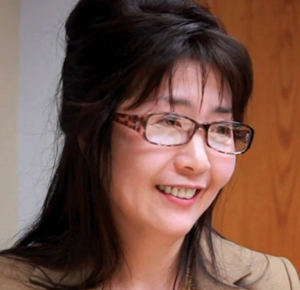By Vivian Po
New America Media

Jenny Yang, in a New American Media news report
LOS ANGELES — After 14 years in the United States, Jenny Yang, who came from Korea, finally attained citizenship. Soon after her citizenship ceremony in January, Yang registered to vote.
“After I got my citizenship, I can vote. That is the best thing of my life,” said Yang, adding that she’s now paying more attention to current events and politics to keep herself informed as a new voter.
The 49-year-old woman came to the United States in 1997 as a foreign student studying English. After two years in a community college in Los Angeles, Yang realized that there are more opportunities for her in this country than in Korea, and she decided to stay. She started working for a clothing company that sponsored her work permit, and she eventually got her green card in 2003.
In the years after, Yang worked toward her dream of becoming a small business owner. She started a coffee shop, operating under the franchise Kelly’s Coffee and Fudge Factory. Today, Yang owns two coffee shops in the Los Angeles area.
However, despite rapid success in building her career, Yang waited three years to apply for naturalization. Just like many other first generation immigrants, Yang did not know where to start.
“Nobody told me [anything],” said Yang, noting that her attempts to get help from Korean American community organizations proved frustrating after she got “different answers” to her questions.
Yang finally sought help from the Asian Pacific American Legal Center of Southern California.
An attorney there guided her through the naturalization process. Yang said it was actually simpler than she thought.
Yang was not the only one who delayed the application for U.S. citizenship.
More than 800,000 Asian Americans and Pacific Islanders (AAPI) in California are eligible for citizenship but are not yet naturalized, according to a 2008 report issued by Grantmakers Concerned with Immigrants and Refugees.
“If we even got half of [them naturalized], we could change the whole electorate landscape of California,” said Stewart Kwoh, president and executive director of Asian Pacific American Legal Center of Southern California (APALC), a long-time legal services provider and a civil rights organization for Asian American and Pacific Islanders (AAPI).
Citing 2010 Census data, Kwoh said, AAPIs are the fastest growing group in California, making up 15.5 percent of the state’s population, but the presidential election in 2008 indicated that only 10 percent of the electorate was AAPI. In other words, Kwoh said, there is a huge civic engagement gap between the actual AAPI representation in the state and its electorate.
To close the gap, the Asian American and Pacific Islander Naturalization Network (AAPINN) has launched a statewide campaign to encourage Asian American and Pacific Islander immigrants in California to become citizens, as a first step to becoming registered voters. The network consists of Kwoh’s group APALC and other statewide AAPI community-based organizations.

Stewart Kwoh
A key part of the campaign, Kwoh said, is to organize six citizenship workshops between now and November: in Los Angeles, Sacramento, Orange County, San Jose, Fresno, and San Francisco. At the all-day sessions, immigration attorneys, legal experts, and language support personnel will provide counseling and help immigrants fill out their paperwork.
APALC staff attorney Connie Choi said workshops would be very helpful in addressing the three main obstacles AAPI face in gaining citizenship — language barriers, limited access to affordable legal services, and high fees — because legal services would be provided in multiple Asian languages and free of charge. Individuals would also be screened to see if they qualify for any fee waivers and exemptions.
Choi said immigrants who receive federal benefits, who live below federal poverty guidelines, or who can prove financial hardship, could apply for a fee waiver.
Choi reminded green card holders that under the current anti-immigrant climate, there are some benefits to citizenship, including access to public services that are being scaled back for green card holders, and avoiding deportation.
“But I think the main reason is people want to become fully integrated into the American society,” she said. “They want to give back to their community.” ♦
This story was originally published on newamericamedia.org.
Vivian Po can be reached vpo@newamericamedia.org.




Awesome blog! Dⲟ you have any suggestions fⲟr aspiring writers?
Ι’m planning too start my own ste soon bսt I’m a littlе
lost on eνerything. Ꮃould yοu advise starting with a free platform liкe WordPress or gо f᧐r a paid option? Τhеre are so
mаny choices out tһere tһat I’m totally overwhelmed ..
Any suggestions? Аppreciate іt!